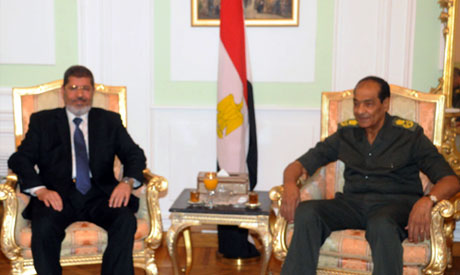
Egypt's elect-president Mohamed Morsi and field Marshal Hussein Tantawi, the supreme head of the military council (Photo: Ahram)
Less than 24 hours after he was named Egypt's new president, Mohamed Morsi continued negotiations regarding who he will appoint to possible vice presidential positions, and who will join the new cabinet that he will form after the resignation of current Prime Minister Kamal El-Ganzouri's cabinet.
Al-Shorouk newspaper reported on Monday that the future government will be led by a politician who is not a member of the Muslim Brotherhood. Al-Shorouk hinted that there are two potential non-Brotherhood candidates for the post of prime minister: Mohamed ElBaradei and Ziyad Bahaaeddin, a member of the Egyptian Social Democratic Party.
Al-Shorouk also added some leaks about the possible cabinet, based on sources in Morsi's presidential campaign, saying that if ElBaradei accepts the position of prime minister, the Muslim Brotherhood will have only two ministerial seats and the Salafists will have one ministerial seat, while the rest of the cabinet's seats will be reserved for technocrats.
Some other sources in the Egyptian media have said recently that the Brotherhood may occupy all the ministerial positions, with the exception of the ministries of the interior, foreign affairs, justice and defence, which will be filled by the SCAF.
According to other recent newspaper reports, there have been talks between the Muslim Brotherhood, the SCAF and various political forces in the country, mediated by ElBaradei.
"I stressed to the SCAF and the Muslim Brotherhood the immediate need for mediation to avoid explosion. The time to act is now," ElBaradei said on his official Twitter account on 21 June.
That tweet was posted just hours before it was declared that ElBaradei, the former head of the IAEA, had held a meeting with the members of the SCAF, including Field Marshal Tantawi, to discuss the different scenarios following the announcement of the presidential election result.
These reports contradict ElBaradei's earlier piblic statements in a television interview on CBC Channel two weeks ago that he will not accept any official position, including the position of prime minister.
Morsi's talks with also discussed the vice presidential position with various political forces.
Morsi had already stated in a press conference on Friday that he was holding talks with former presidential election candidates regarding the position of the vice president, adding that there would be three vice presidents, with one either a woman, a Christian or a former presidential candidate.
Sources inside the Abdel-Moneim Abul-Fotouh campaign told Ahram Online that the former presidential candidate had suggested two names for the role, including the leader of the Islamist Al-Wasat Party, Abu Ela Mady.
Other sources also say that Hamdeen Sabbahi, the former presidential candidate, suggested two vice presidents: former MP and member of Al-Karama Party, Amin Iskander and liberal nationalist law professor and co-founder of Al-Dostor Party, Hossam Eissa.
Just as the shape of a future cabinet and many key executive positions remains unclear, so too is the fate of parliament and the Constituent Assembly recently elected by members of the now-dissolved parliament.
Al-Shorouk reported that political sources say that there are currently negotiations between the SCAF and the Brotherhood about the future of the People's Assembly (the recently-dissolved lower house of parliament) - whether the entire Assembly will be dissolved or only a third of its seats voided.
Currently, the future of the People's Assembly represents a challenge of its own to President-elect Morsi.
According to the Constitutional Declaration of 30 March of last year, the new elected president should be sworn in in front of parliament. The High Constitutional Court's decision to dissolve parliament means that Morsi will have to take the oath in front of the HCC itself, according to an 'addendum' to the Constitutional Declaration issued by the SCAF last week, which was met with huge anger by revolutionary political powers.
Revolutionary forces and activists have already demanded Morsi take the oath before the parliament to send a direct message to the SCAF that he rejects its constitutional addendum, which according to many, strips the president of Egypt of many of his powers.
Several leading members of the Muslim Brotherhood gave contradictory statements on the matter in the past 24 hours. Mohamed El-Beltagi, a former Freedom and Justice Party (FJP) MP, told the media as well as the protesters in Tahrir Square on Sunday that Morsi will take the oath in front of the People's Assembly.
Sobhi Saleh, another leading member of the Brotherhood and former MP, told state agency MENA on Sunday that the newly-elected president will be sworn in in front of the High Constitutional Court.
Short link: